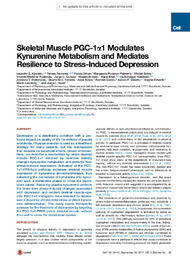Título :
Skeletal muscle PGC-1α1 modulates kynurenine metabolism and mediates resilience to stress-induced depression |
Autor :
Agudelo, Leandro Z.
Femenía Cantó, Teresa
Orhan, Funda
Porsmyr Palmertz, Margareta
Goiny, Michel
Martínez Redondo, Vicente
Correja, Jorge C.
Izadi, Manizheh
Bhat, Maria
Schuppe Koistinen, Ina
Pettersson, Amanda T.
Ferreira, Duarte M.S. |
Editor :
Elsevier |
Departamento:
Departamentos de la UMH::Farmacología, Pediatría y Química Orgánica |
Fecha de publicación:
2014 |
URI :
https://hdl.handle.net/11000/35429 |
Resumen :
Depression is a debilitating condition with a profound
impact on quality of life for millions of people
worldwide. Physical exercise is used as a treatment
strategy for many patients, but the mechanisms
that underlie its beneficial effects remain unknown.
Here, we describe a mechanism by which skeletal
muscle PGC-1a1 induced by exercise training
changes kynurenine metabolism and protects from
stress-induced depression. Activation of the PGC-
1a1-PPARa/d pathway increases skeletal muscle
expression of kynurenine aminotransferases, thus
enhancing the conversion of kynurenine into kynurenic
acid, a metabolite unable to cross the bloodbrain
barrier. Reducing plasma kynurenine protects
the brain from stress-induced changes associated
with depression and renders skeletal muscle-specific
PGC-1a1 transgenic mice resistant to depression
induced by chronic mild stress or direct kynurenine
administration. This study opens therapeutic
avenues for the treatment of depression by targeting
the PGC-1a1-PPAR axis in skeletal muscle, without
the need to cross the blood-brain barrier.
|
Área de conocimiento :
CDU: Ciencias aplicadas: Medicina: Farmacología. Terapéutica. Toxicología. Radiología |
Tipo de documento :
info:eu-repo/semantics/article |
Derechos de acceso:
info:eu-repo/semantics/openAccess
Attribution-NonCommercial-NoDerivatives 4.0 Internacional |
DOI :
10.1016/j.cell.2014.07.051 |
Publicado en:
Cell, 2014;159(1):33 - 45 |
Aparece en las colecciones:
Artículos - Farmacología, Pediatría y Química Orgánica
|

 La licencia se describe como: Atribución-NonComercial-NoDerivada 4.0 Internacional.
La licencia se describe como: Atribución-NonComercial-NoDerivada 4.0 Internacional.
.png)